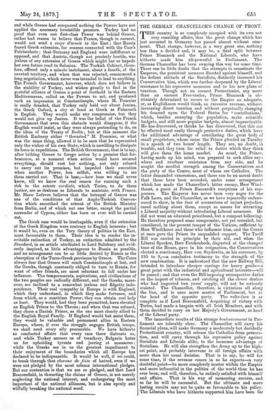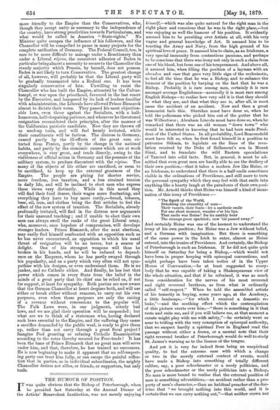THE GERMAN CHANCELLOR'S CHANGE OF FRONT. T HIS country is so
completely occupied with its own not very consoling affairs, that the great change which has just occurred in Germany has passed almost without com- ment. That change, however, is a very great one, nothing less than a decided and, it may be, a final split between Prince Bismarck and the National Liberals, who have hitherto made him all-powerful in Parliament. The German Chancellor has been swaying this way for some time. There can be little doubt that the attempts to assassinate the Emperor, the persistent menaces directed against himself, and the defiant attitude of the Socialists, distinctly increased his Conservative bias, which was further deepened by the Liberal resistance to his repressive measures and to his new plans of taxation. Though not an earnest Protectionist, any more than an earnest Free-trader, Prince Bismarck is ob- stinately determined to secure to the Empire an adequate, or, as Englishmen would think, an excessive revenue, without increasing direct taxation and without perpetually changing his demand upon the Federal States for " contributions," which, besides annoying the population, make scientific budgets, and still more popular budgets, almost impracticable. He has discovered, or thinks he has discovered, that this can be effected most easily through protective duties, which have the additional advantage of conciliating the great body of small proprietors, whose cause the Prince pleaded on Tuesday in a speech of two hours' length. They are, no doubt, in trouble, and they turn for relief to duties which they think will give them the home market. As usual, the Prince, having made up his mind, was prepared to seek allies any- where and overbear resistance from any side, and he sought the needful strength among the Conservatives and the party of the Centre, most of whom are Catholics. The latter demanded concessions, and there can be no moral doubt that these have been accorded, under some arrangement which has made the Chancellor's bitter enemy, Herr Wind- thorst, a guest at Prince Bismarck's receptions of his sup- porters. The Emperor has never been very eager for the Falk Laws, and the Chancellor, as we have repeatedly endeav- oured to show, in the face of accusations of unjust prejudice, cared nothing about them, except as means for attracting a Liberal majority without introducing Liberal measures. He did not want an educated priesthood, but a compact following. He therefore proposed some compromise, not yet revealed, but considered, in the present temper of the Vatican, sufficient by Herr Windthorst and those who influence hini, and the Centre at once gave the Prince its unqualified support. The Tariff Bill was carried in principle by their aid, and when the Liberal Speaker, Herr Forckenbeck, disgusted at the changed tone of the House, gave in his resignation, the Conservatives elected a reactionary, Herr von Seydewitz, as his successor, by 195 to 9,—a conclusive testimony to the strength of the new combination. It is understood that the new Railway Bill, intended to introduce cheaper carriage for heavy goods—a great point with the industrial and agricultural interests—will be passed ; and that even the Bill imposing retrospective duties on the import of tobacco, and catching all the clever dealers who had imported two years' supply, will not be seriously resisted. The Chancellor, therefore, is victorious all along the line, and is once more master of Parliament, but at the head of the opposite party. The volte-face is as complete as if Lord Beaconsfield, despairing of victory with Tories, had made a bargain with all Irish Members, and with them decided to carry on her Majesty's Government, as head of the Liberal party.
The immediate results of this strange bouleversement in Par- liament are tolerably clear. The Chancellor will carry his financial plans, will make Germany a moderately but decidedly Protectionist country, will release the Catholics from persecu- tion, and will carry through his repressive policy against Socialists and Liberals alike, to the immense advantage of Socialism. He will also strengthen the Army up to the high- est point, and probably intervene in all foreign affairs with more than his usual decision. That is to say, he will for some time, if the revenue comes in as he expects—a very doubtful point—be more completely master within the Empire and more influential in the politics of the world than he has ever been, and will, therefore, be entirely satisfied with himself and affairs. That is his way of measuring success, and so far he will be successful. But the ultimate and more lasting results may not be quite so favourable to his policy. The Liberals who have hitherto supported him have been far more friendly to the Empire than the Conservatives, who, though they accept unity as necessary to the independence of the country, have strong proclivities towards Particularism, and what would be called in America " State-rights." No Minister quite escapes the influence of his followers, and the Chancellor will be compelled to pause in many projects for the complete unification of Germany. The Federal Council, too, is sure to be more difficult to manage under a Reactionary than under a Liberal regime, the consistent adhesion of Baden in particular being almost a necessity to secure to the Chancellor the steady majority which Prussia, by herself, does not possess. Baden is not likely to turn Conservative. The greatest change of all, however, will probably be that the Liberal party will be gradually transmuted into a Radical one. It has been singularly conservative of late. Unwilling to resist the Chancellor who has built the Empire, attracted by the Cultur- kampf, or war upon the priesthood, favoured in the last resort by the Executive, and hampered by its lack of leaders familiar with administration, the Liberals have allowed Prince Bismarck almost to dictate their votes. They passed his most objection- able laws, even those against the Socialists, with a half- humorous, half-despairing patience, and whenever he threatened resignation reconsidered their principles, after the manner of the Californian patriotic candidate. Now they are thrown off as used-up tools, and will feel keenly irritated, while their constituents will be furious. The distress in Germany, caused partly by the ill-effects of the great sum ex- torted from France, partly by the change in the national habits, and partly by the economic causes which are at work everywhere, is very great, and tends directly, owing to the visibleness of official action in Germany and the pressure of the military system, to produce discontent with the regime. Too many of the objects of life either are sacrificed, or seem to be sacrificed, to keep up the external greatness of the Empire. The people are pining for shorter service, more freedom, less taxation, and a less strained tension in daily life, and will be inclined to elect men who express these views very distinctly. While in this mood they will find their food dearer, their wages more fluctuating, and everything they have to buy more costly,—bread, tobacco, beer, oil, iron, and clothes being the first articles to feel the effect of the new system of taxation. The Socialists, already profoundly irritated, will find in the distress new arguments for their unsound teaching ; and if unable to elect their own men can always swell the ranks of the great Liberal army, who, moreover, once hopeless of compromises, will develope stronger leaders. Prince Bismarck, after the next elections, may easily find himself confronted with an opposition such as he has never encountered, an opposition to which his usual threat of resignation will be no terror, but a source of delight. One of his strongest weapons will thus be broken in his hands, and he will be reduced to depend- ence on the Emperor, whom he has partly swayed through his popularity, and on a party which very often will not sym- pathise with his designs, or even understand them. He is no junker, and no Catholic either. And finally, he has lost that power which comes in every State from the belief in the minds of a great party that its chief can be relied on, if not for support, at least for sympathy. Both parties are now aware that the German Chancellor at heart despises both, and will use either or break either without remorse, to carry out his own purposes, even when those purposes are only the raising of a revenue without concessions to the popular will. The Falk Laws were, in our judgment, utterly bad laws, and we are glad their operation will be suspended ; but what are we to think of a statesman who, having declared such laws essential to the Empire, and the suffering they cause a sacrifice demanded by the public weal, is ready to give them up, rather than not carry through a great fiscal project I Imagine Peel granting or refusing Catholic Emancipation according to the votes thereby secured for Free-trade I It has been the bane of Prince Bismarck that no great man will serve under him, and that, therefore, he has trained no successors. He is now beginning to make it apparent that no self-respect- ing party can trust him fully, or can escape the painful reflec- tion that in parties, as in individual subordinates, the mighty Chancellor desires not allies, or friends, or supporters, but only tools.



































 Previous page
Previous page